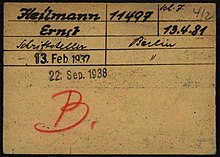Ernst Heilmann
Ernst Heilmann (13 April 1881 – 3 April 1940) was a German jurist and politician of the Social Democratic Party of Germany.

Ernst Heilmann | |
|---|---|
| Member of the IV. Reichstag | |
| In office 1928 – 1933 | |
| Personal details | |
| Born | 13 April 1881 Berlin |
| Died | 3 April 1940 (aged 58) Buchenwald concentration camp |
| Nationality | |
| Political party | Social Democratic Party of Germany |
| Alma mater | University of Berlin |
| Profession | Jurist |
Born in Berlin in what was then Prussia, Heilmann attended the University of Berlin, majoring in law and political science. In World War I, he was a proponent of the German party truce (Burgfriedenspolitik). Heilman gained a seat in the Reichstag in the 1928 German federal election. Not long after Hitler and the Nazi's seized power (Machtergreifung), Heilmann was arrested by the Gestapo and imprisoned in the first of a series of concentration camps in which he was to spend nearly seven years.[1] From February 1937 he was kept in Dachau concentration camp, being transferred in September 1938 to Buchenwald concentration camp, where he was executed in April 1940.[2][3]
References
- Lösche, Peter (1988). Ernst Heilmann (1881–1940). Parlamentarischer Führer und Reformsozialist. Berlin: Colloquium Verlag. p. 119.
-
- Möller, Horst (2003), "Ernst Heilmann. Ein Sozialdemokrat in der Weimarer Republik", in Wirsching, Andreas (ed.), Aufklärung und Demokratie. Historische Studien zur politischen Vernunft (in German), Munich: Oldenbourg, pp. 200–225, ISBN 3-486-56707-1.
-
- Winkler, Heinrich August (1990), "Choosing the Lesser Evil: The German Social Democrats and the Fall of the Weimar Republic", Journal of Contemporary History, 25 (2/3): 205–227, doi:10.1177/002200949002500203.
External links
- Klaus Malettke (1969), "Heilmann, Ernst", Neue Deutsche Biographie (NDB) (in German), 8, Berlin: Duncker & Humblot, pp. 260–261
- Ernst Heilmann in the German National Library catalogue